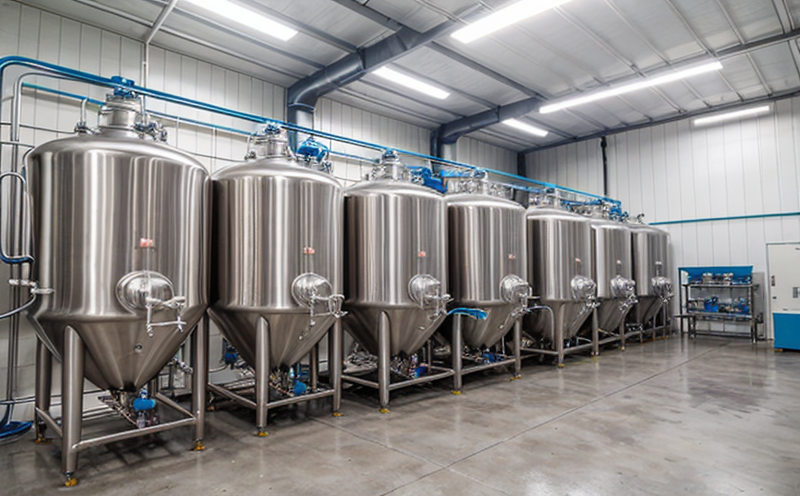EN 13697 Antimicrobial Activity Testing in Biotech Fermentation Systems
The European standard EN 13697 specifies a method to determine the antimicrobial activity of biocidal agents used in industrial fermentation systems. This testing is critical for ensuring that the biocides employed do not interfere with or alter the fermentation process, thereby maintaining product quality and safety.
Biological and microbiological testing within the context of industrial fermentation involves a series of complex processes where microorganisms are grown under controlled conditions to produce valuable compounds such as enzymes, pharmaceuticals, and biofuels. In these systems, biocides play a crucial role in controlling microbial growth and preventing contamination. However, it is essential that any antimicrobial agent used does not adversely affect the fermentation process or the final product.
The standard provides a standardized approach to assess the compatibility of biocides with industrial fermentations. This includes evaluating the efficacy of the biocide against target microorganisms while ensuring minimal disruption to the fermentation environment and the end product. The testing protocol is designed to be both rigorous and reproducible, allowing for consistent results across different laboratories.
The method outlined in EN 13697 involves several key steps:
- Selection of appropriate test organisms
- Dilution of biocide solutions
- Preparation of fermentation medium
- Introduction of test organisms into the system
- Application of the biocide to the fermentation system
- Observation and measurement of antimicrobial activity over time
- Evaluation of the impact on fermentation parameters such as temperature, pH, and dissolved oxygen levels
The standard also provides criteria for acceptable results, which include both quantitative measures (e.g., reduction in microbial load) and qualitative assessments (e.g., changes in fermentation kinetics). These criteria ensure that the biocide does not compromise the efficiency or safety of the fermentation process.
Compliance with EN 13697 is essential for companies involved in industrial fermentation, as it helps to mitigate risks associated with microbial contamination. By ensuring that the biocides used are compatible with the fermentation process, manufacturers can enhance product quality and maintain regulatory compliance.
The testing procedure described in this standard is particularly relevant for industries such as pharmaceuticals, biotechnology, and food processing, where high-quality products are critical. It allows companies to select appropriate biocides that meet both their antimicrobial needs and the specific requirements of their fermentation systems.
Benefits
Adhering to EN 13697 offers several advantages for industrial fermentation facilities:
- Enhanced Product Quality: Ensures that biocides do not interfere with the fermentation process, thereby maintaining product quality.
- Increased Safety: Reduces the risk of microbial contamination, which can lead to spoilage or even health hazards.
- Regulatory Compliance: Helps facilities meet regulatory requirements, ensuring that they are in line with international standards.
- Improved Efficiency: By selecting biocides that do not disrupt the fermentation process, companies can optimize their production processes.
- Cost Savings: Reducing contamination risks leads to lower waste and reprocessing costs.
- Enhanced Reputation: Demonstrating adherence to international standards enhances a company's reputation in the market.
In summary, EN 13697 provides a robust framework for evaluating antimicrobial activity in industrial fermentation systems. This ensures that biocides used are both effective and compatible with the process, leading to better product quality and operational efficiency.
Competitive Advantage and Market Impact
The implementation of EN 13697 can provide significant competitive advantages for companies operating in industrial fermentation. By ensuring that biocides do not interfere with the fermentation process, these companies can:
- Promote Product Differentiation: Offering products that are consistently high in quality and safety can set a company apart from competitors.
- Increase Customer Trust: Demonstrating adherence to international standards builds trust among customers and stakeholders.
- Facilitate Global Expansion: Compliance with European standards opens up opportunities for expansion into the European market, which is one of the largest in the world.
- Attract Investment: Investors are more likely to be attracted to companies that demonstrate a commitment to quality and safety.
In the highly competitive global market, these advantages can significantly impact a company's market position. By ensuring that their biocides do not interfere with fermentation processes, companies can enhance their reputation and increase their chances of success.
Use Cases and Application Examples
The application of EN 13697 is particularly relevant in industries such as pharmaceuticals, biotechnology, and food processing. Here are some specific use cases:
- Pharmaceutical Industry: Ensuring that the production environment remains free from microbial contamination is crucial to prevent product spoilage or contamination.
- Biotechnology: In industrial fermentation processes used for producing enzymes and other bioproducts, maintaining a clean environment is vital for consistent output.
- Food Processing Industry: The use of biocides in food processing facilities must be carefully monitored to ensure that they do not affect the quality or safety of the final product.
In each of these industries, EN 13697 provides a standardized approach for evaluating antimicrobial activity. This ensures that biocides are both effective and compatible with the specific requirements of the fermentation process. The following examples illustrate how this standard can be applied in practice:
- Pharmaceutical Production: A pharmaceutical company uses EN 13697 to test a new biocide for its fermentation processes, ensuring that it does not interfere with the production of antibiotics.
- Biofuel Production: An energy company employs this standard to evaluate the effectiveness of a biocide in preventing microbial contamination during biofuel production.
- Food Processing: A food manufacturer uses EN 13697 to ensure that its biocides do not affect the taste or texture of the final product.
In each case, the standard provides a reliable method for evaluating antimicrobial activity and ensuring compliance with international standards. This helps companies maintain consistent quality and safety in their products.





